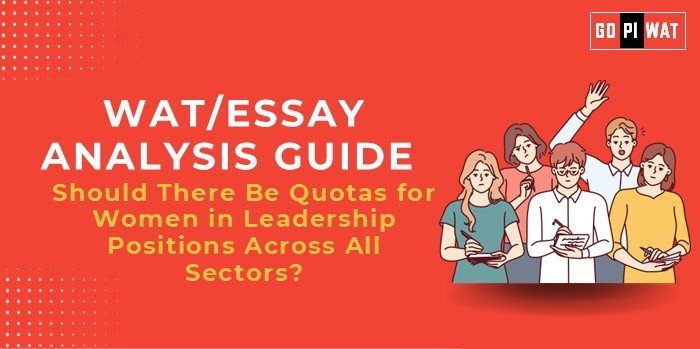📋 Should There Be Quotas for Women in Leadership Positions Across All Sectors?
🌐 Understanding the Topic’s Importance
Gender quotas aim to address the persistent gap in leadership roles and promote equitable opportunities for women. For business school students, this topic connects to themes of HR strategy, corporate governance, and ethical leadership, highlighting the importance of diversity for organizational success and societal progress.
🗓️ Effective Planning and Writing
- ⏱️ Time Allocation:
- Planning: 5 minutes
- Writing: 20 minutes
- Review: 5 minutes
- 📊 Preparation Tips: Research global case studies, understand the economic and cultural impacts of quotas, and address potential criticisms with balanced solutions.
📝 Introduction Techniques for Essays
- ⚖️ Contrast Approach: “Despite evidence that diverse leadership improves organizational performance, women occupy only 17% of senior roles in India.”
- 💡 Solution-Based Start: “Gender quotas offer a structured approach to rectify leadership inequalities.”
📚 Structuring the Essay Body
- 🏆 Achievements: Highlight global successes like Norway’s quotas, which increased female board representation to 40%, and France’s legislative efforts that set a 40% target by 2026.
- ⚠️ Challenges with Comparative Analysis: Discuss concerns of tokenism and resistance, referencing Germany’s slow adoption and cultural biases in countries like India.
- 🔮 Future Outlook: Propose combining quotas with inclusive workplace policies, leadership training programs, and long-term cultural shifts to sustain progress.
📄 Concluding Effectively
- ⚖️ Balanced Conclusion: “Quotas are a starting point for gender parity, but cultural change is crucial for lasting impact.”
- 🌍 Global Comparison Conclusion: “Learning from Norway’s success and Germany’s challenges can guide effective quota implementation globally.”
📊 Analyzing Successes and Shortcomings
Key Achievements:
- 💼 Economic Benefits: Diverse leadership correlates with improved financial performance and decision-making.
- 📈 Higher Representation: Quotas have increased women’s representation on boards in countries like Norway and France.
- 🌍 Cultural Shifts: Encourages broader acceptance of women in leadership roles.
Ongoing Challenges:
- ⚠️ Resistance: Concerns over meritocracy and implementation complexities.
- 🧩 Tokenism: Risk of appointing women as symbolic gestures without substantial authority.
- 🔍 Underlying Biases: Persistent cultural and organizational biases hinder progress.
Global Context:
- 🇳🇴 Norway: Achieved significant success with mandatory quotas.
- 🇫🇷 France: Legislation targets balanced representation but faces challenges in enforcement.
- 🇮🇳 India: Low representation highlights the need for stronger policy initiatives.
🌟 Recommendations for Sustainable Progress
- 🤝 Combine Quotas with Mentorship: Implement structured mentorship and leadership development programs for women.
- 📋 Policy Enforcement: Ensure robust implementation and periodic review of quota policies.
- 🌐 Cultural Change: Encourage workplace inclusivity and address unconscious biases through training programs.
📄 Sample Short Essays
- ⚖️ Balanced Perspective: “Quotas ensure representation but must be paired with mentorship and workplace inclusivity initiatives for meaningful change.”
- 💡 Solution-Oriented: “Implementing gender quotas alongside skill-building programs can close the leadership gap effectively.”
- 🌍 Global Comparison: “Norway’s quota success underscores the potential of similar policies in countries lagging in gender parity.”


